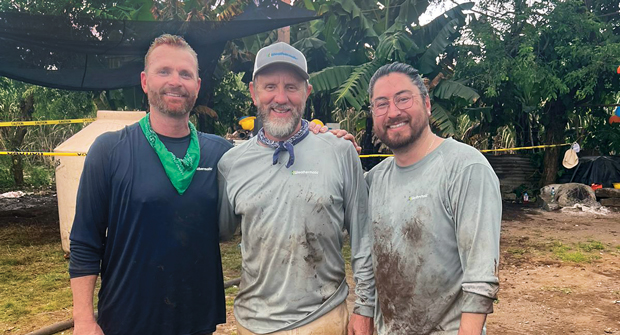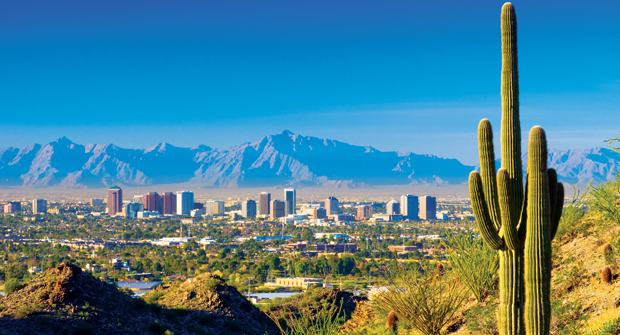It is just in Weathermatic’s DNA to care about water. The smart water technology company has worked alongside lawn care and landscape professionals since 1945, striving to save water while helping their customers grow their businesses.

About 15 years ago, Weathermatic decided to take their goodwill mission of saving water in a different direction: by using a portion of the company’s sales to support impoverished communities worldwide and give them the gift of clean drinking water.
The “Save Water. Give Life” initiative joined Weathermatic and its customers with an international organization that connects volunteers with an experienced drilling crew to provide clean water to a community in need. Thanks to Weathermatic and its partners, Haiti now has 15 wells, Nicaragua has six and El Salvador four, among many more.
For safety reasons, the pandemic forced Weathermatic to push pause on the trip for the last few years. But this summer, the company was able to start up again with the good cause and assembled a crew of nine volunteers for a weeklong trip to Guatemala.
Joining representatives from Weathermatic were volunteers from Southern Botanical in Dallas and Outdoor Systems Management in Scottsdale, Ariz., as well as the Gachina brothers — Michael and Dominic of Gachina Landscape Management, a family-owned business servicing Northern California.
Michael Gachina, the business development manager and the health and safety manager for the company, says a number of reasons made him want to take the trip. Gachina is onboarding Weathermatic controllers into the company, so this was a chance to get to know their representatives. He also hoped that after the trip was over, he and his brother could take some time off together to explore a new country. But the primary reason, he says, was this simply wasn’t an opportunity that came around very often.
“It was a chance to go with my brother to another country and take some time off from work, and even though it was hard work, it’s something that we could clear our minds from the family business for a little bit,” Michael Gachina says. “We wanted to do a good thing. Having the opportunity to go into a less fortunate, impoverished community and build a well — but also go into the schools there and teach children about hygiene — seemed like a really awesome opportunity that doesn’t come by every day.”
A tribute to Brodie
Parry Webb, Weathermatic vice president, has been on this goodwill trip a half-dozen times or so. He says he and Brodie Bruner, the former executive vice president of Weathermatic, used to take turns. Bruner tragically passed away earlier this year.
“It’s really been a way to honor (Bruner’s) memory and the memory of a couple of others who have since passed away,” Webb says. “It’s become part of our core values here at Weathermatic. We hope to go again next spring.”
The work itself is physical, Webb says, but the good news is the crew that joins the volunteers know what they’re doing.
“The guys on the rigs are pretty professional. We’re simply the muscle to get the drill rig in place,” Webb says. “The segments of pipe, which are either 2 or 3 meters long, can be heavy. And we keep the drill rig running, moving a lot of dirt.”
Dominic Gachina, who runs the company’s San Jose location, says though he has plenty of experience in the landscaping industry, drilling a well was a completely new experience for him.
“It’s labor-intensive, physical work,” he says. “We ran into some trials and tribulations on the project. Our bit got stuck about 80 feet down. We had to get that drill unstuck, which meant we needed to physically take out every bit, piece by piece, then set up the new drill and get back on track.”
The day the drill bit was finally pried loose earned Dominic a new nickname among the crew and the locals who were anxiously watching the process: King Kong.
“They claim it was my brute strength that got the bit unstuck, but I think it was a group effort,” Dominic Gachina says with a laugh. “It was nice and endearing to get that nickname, but it was through teamwork and the Holy Spirit that we got that bit unstuck.”
Fulfillment of a prayer
Providing clean water is only half of the mission of Save Water, Give Life. They also have a program for volunteers to visit a local school and, through a translator, talk to the kids about the importance of good hygiene and hand washing.
“The hygiene classes were so fun. The kids got so excited,” says Chantel Ortiz, Weathermatic’s director of implementation and customer success. “You really do get to form relationships. Kids don’t care what language you speak; they care that you care.”
“These weren’t small classrooms; it was a few hundred kids,” Michael Gachina adds. “And then you go back to the drill site, and some of the kids lived in the houses near where we were drilling. They’d come out, watch us work and hang out. It was a good opportunity to practice and use our Spanish.”
During the trip, the locals invited the volunteers to join them on a corn harvest so they could show them a drink they made. Then, the locals invited the crew into their homes.
“One of the most shockingly beautiful parts of the trip was when we showed up, (the locals) were so excited,” Ortiz says. “They were the ones who applied for the well. To have them be so warm and welcoming and excited … these were women who were thinking about their children. It was the most beautiful thing.”
Webb says he’ll fondly recall the children he met on the trip and playing soccer with them. But the most memorable part for him, he says, was how important the well was to the adults in the village.
“It really is a humbling experience because a lot of these people have been praying for clean water all their lives — 60-, 70-year-old ladies who have prayed to God all their lives for clean water,” Webb says. “You’re representing the fulfillment of that prayer, so it can get pretty emotional.”
Ken and Cori Bergeron own a Grounds Guys franchise in the Dallas suburb of Grapevine, Texas, that offers its customers a full slate of residential and commercial landscaping services. But that doesn’t mean the couple always dreamed of a career in the green industry.
Their parents weren’t in the landscape industry. They didn’t grow up with their own lawn-mowing business or work summers toiling for a local lawn care company. It’s not that they had anything against that kind of work, mind you. It’s just that both of them were focused on other pursuits.
Namely, military service at the highest possible level they could achieve. Both Ken and Cori went to West Point, which is where they first met and were later married, the day after they graduated.
“Graduation was really the only time we were going to have both of our families together before we began our service, so it just made sense,” Cori Bergeron says about having two major life events on successive days.
Cori Bergeron went on to serve with the Army Corps of Engineers, while Ken Bergeron served in the Air Defense Artillery. Their service took the couple to points around the country and the globe — Kansas, Germany, Central America, California — and they were rarely stationed anywhere near each other in the first part of their service and their marriage.
When they finally left active duty in 1990, they settled into what Ken Bergeron calls “the full corporate environment,” working in executive leadership roles and doing consulting work. But the couple has always had an entrepreneurial streak — while stationed at Fort Riley, Kan., the couple owned a restaurant in nearby Manhattan, Kan. — and were looking to write another chapter in their life, so they began looking into franchise opportunities.

Which brings us full circle to the world of landscaping and, ultimately, their partnership with Grounds Guys and that brand’s parent company, Neighborly, which has an established track record of supporting military veterans and providing them a pathway into franchise ownership among its 19 different brands.
“We did a pretty thorough investigation of opportunities and looked at a lot of different brands,” Cori Bergeron says. “But we kept coming back to Grounds Guys and Neighborly. The more we looked, the more we knew that their model fit us. And with their support of veterans as franchise owners, it just made sense.”
“Our experience has been that veterans do exceptionally well in a franchise model,” says Brian Wieters, Neighborly’s group vice president of franchise development. “They already understand how to follow a plan. They are trained on it, and they understand it inherently. And when things happen and that plan changes, they have the ability to adapt and overcome. Then there’s the whole sense of purpose, of working on something that’s bigger than themselves. All that lines up to give veterans like Ken and Cori a recipe for almost immediate success in this model.”
A helping hand
That model didn’t come about by accident. It was all part of a plan championed by the man who founded what would ultimately become the Neighborly collection of home services companies, Don Dwyer Sr., a veteran himself. At the time, five companies were under the umbrella of what was the Dwyer Group, and its founder wanted those companies to offer benefits to his fellow veterans.
“He wanted to do something for veterans as they were coming back home and transitioning out of active duty and into the workforce,” Wieters explains. “He decided to provide a discount to veterans that wanted to get into business and a plan to educate them on why business ownership could be really good for them as veterans.”
The plan paid off for both the veterans and the company, so much so that the International Franchise Association latched on to the idea and took Dwyer’s idea to the national level. Now, over 600 member companies participate in the IFA’s VetFran, an initiative that provides incentives, job placement, discounts at franchise companies and discounted membership for veterans interested in starting a franchise.
As the Dwyer Group transitioned into Neighborly, its own initiatives for veterans followed right along. The program offers veterans a set of tools, a structured path to ownership and a network of support that has ultimately attracted about 750 veteran franchise owners. Currently, over 400 individual franchises within Neighborly’s 19 brands are owned by veterans.
“When we look at the top performers in every brand, anywhere from 40 to 60 percent of our top 10 in each brand are owned by veterans,” Wieters says. “Because of what these veterans bring to the table and what we offer them in terms of support, that’s not a surprise to us.”
A match made in service
Thanks to their background and mindset, the Bergerons were immediately attracted to franchising as they began exploring new business opportunities.
“We’re both math people, engineers, so the numbers matter to us,” Ken Bergeron says. “And when you look at the math, most small businesses fail at a 50 percent rate within their first few years. Franchises survive at a much higher rate — something like 85 or 90 percent — and that really appealed to us.”
The model for veterans that Grounds Guys and Neighborly could offer and the successful track record.


